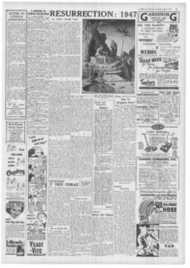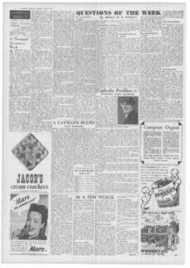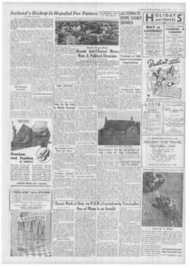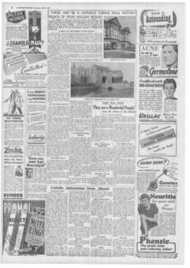Page 6, 3rd April 1947
Page 6

Report an error
Noticed an error on this page?If you've noticed an error in this article please click here to report it.
Tags
Share
Related articles
"class" And The Catholic Novel
The Catholic Novel
The Catholic Novel Sat.—i Read With Satisfaction, Marred...
"i Respectfully Salute You
The Stone Loved One
WHAT IS A CATHOLIC NOVEL?
W. J. IGOE ("C.H." Fiction Reviewer) in a brilliant answer discusses Chesterton, Graham Greene, Waugh, Kate O'Brien and Bruce Marshall
"NOR let us be too hard," wrote Belloc. " upon the hat but anxious fellow that sat down dutifully to paint the Soul of Switzerland upon a fan."
The reviewer is aware that the quotation can be interpreted variously.
One could write a book on the social and ,psychological manifestations made by the impact of what they are pleased to call the Catholic novel on the minds of Catholics. Seven out of ten of those who read, read fiction. If they are Catholics, each has some opinion of what a Catholic novel should be. Few can say what it is. Many think the novel should provide edification; others want entertainment; one or two hope for " education "; a great number don't know what they want but are violently of the opinion that Catholic novelists are supplying what they don't want.
There is no subject upon which one finds more varied and diametrically opposed views expressed. Them is none more infrequently defiued, In general, and with particular reference to the novel, Catholic Literary criticism is. beyond description, unselfconsciously and brazenly bad.
CONFLICTING VIEWS
The strange, and admittedly extreme, ease of Miss Kate O'Brien's Lund of Spices exemplifies what I mean. Miss O'Brien is a Catholic. Most literary critics would agree that she is a considerable artist. Her Land of Spices is about a convent. It was banned in Eire; in the United Slates a scholary critic described it as the "best book ever written about the convent." This critic is a nun. She should know. I refer to Sister Mariella Gable, O.S.B. This view of Land of Spices is expressed in the introductory essay to the anthology. They Are People. The Irish thought the book had enough to rule out of existence. An American nun gives it the sort of accolade calculated to ensure it the widest circulation. In each instance, persons. no doubt worthy, responsible and honest, returned exactly opposite verdicts on the same book. In each case a Catholic point of view was expressed. The situation is Gilbertian.
On a more serious level of criticism it persists. Differences of opinion widespread enough to be significant are apparent to any person who reads British and American reviews.
. Cronin's Keys of the Kingdom evoked an entirely different response
in British Catholic reviewers than it did from their American colleagues. In the States in some quarters it induced feverish enthusiasm. A few persons claimed it was a masterpiece. On the whole the critical reception was favourable. Even Fr. Gardiner, the Jesuit, a careful, scholarly judge of fiction. and one whose studies are invaluable to other Catholic reviewers. was noticeably pleased with the•book. In England we thought it silly on one plane and offensive on another. We still think we are right. But the point is that we were significantly divided.
Apart from these examples there is considerable evidence that the Catholic reading public, professional and amateur. is without a common principle in judging and distinguishing a truly eatholic work of fiction from the bulk of novels.
I suggest there is only one way of recognising a distinctly Catholic novel. I admit it is a difficult method; I think it is the only one.
The subject matter of any work of fiction is Man, in his relation to society. That is man living with his fellows. The background of his social milieu is the setting. To this the Catholic novelist, as such. must add a second background. It is nothing less than Eternity as defined by the Church. Man ranges on two planes. On the material level he is tied to the world. Spiritually he reaches out to the infinite. A Catholic novel is' one that is, wholly created front a viewpoint that sees man, and each action of man, in re
lation to the crucified God. No other book is worth the name.
A Catholic novelist who permits this vision to be obscured by social values or ideologies, his etiquette of personal choice, may write, within their limitations, honest. goodenough-for-the-world books. He is not a Catholic novelist.
G.K.C. AND GRAHAM GREENE
In England we have had, I believe, two writers who in this sense can
justly be called Catholic. G.K.C. was one; Graham Greene is the other. When one presses through their work to the vision that lies behind it — the similarity is startling. Each presents characters moving against a limitless background. Each is a man of his time; and therein lies the difference in their fictions. It is a difference of mood.
To G.K. it was a wonderful, miraculous lark of the Almighty that this lovable, absurd, eurnic creature —this Sam Weller—should recognisably have something of the Divine. He was grateful.
Greene lives in different times. At the age of ten he saw the war, which was the fruition of one type of materialism. break on Europe. At the age of fourteen he commenced to live through the years that saw man's degradation by that materialism, in its decay and corruption. To him it is almost unbearable that man, the brother of the Son of God, should he defaced, spiritually malformed, by the society which strives to remake him again in its chosen image and likeness. It is the difference between his conception of what is good, his second background. upon which his first, the world, and its obscene and valued gee-gaws, is thrown that gives his work its specifically Catholic vision. In his pages the shadow of the Cross. lies upon the flash hotels, the slums, the tiled lavatories, the smug offices, the moving masses, aimlessly walking on concrete, the arterial roads — the whole bric-a-brac of progress. We are invited to ask ourselves " what Both it profit . ." And it is all without despair. The author is faithful to God and faithful to man. He does not judge his characters. Those who suffer always strive towards redemption. Raven in A Gun for Sale is one such.
He is an assassin. As he appears during the few days and in the situations Greene has contrived for him, he is explained by his own memories. He is outcast by society. He has been raised in a "home." His father was an executed criminal; his mother committed suicide . "she'd cut. her throat—she looked ugly—her head nearly off . . She hadn't even thought enough of me to lock the door."
Locked within himself, his mind only really touching the world with the barrel of a pistol, Raven searches for two men whom he will
kill. In a disturbing way one can see the pattern of a crusade emerge in the quest. The lonely, hunted figure stops before a shop window which contains a Christmas Crib for sale. He looks down at the figure of the child and in his own terms feels kinship. He " knew what the child was in for, the daunted Jews and the double-crossing Judas and only one man to draw a knife on his side when the soldiers conic for him in the Garden."
Greene is the one Catholic who has voiced in fiction the temptation and the faith of his own generation. In a few words placed in the mouth of Pinkie, the Catholic, a boy gangster, in Brighton Rock, is the material of every sermon ever preached. Pinkie wants to marry a Catholic girl in a registrar's office. His motive is to restrain her from giving evidence against him should
he be arrested for murder. Both know they contemplate mortal sin. She appears reluctant.
"You don't want to listen too
• much to priests," he said. " They don't know the world like I do. Ideas change. the world moves on " . . . his words stumbled before her curved devotion. That face said as clearly as words that ideas never changed, the world never moved; it lay there always. the ravaged and disputed territory between the two eternities.
Pinkie glories.in his sin: his pride is its essence. In the Power and the Glory the hunted priest winning through, for a little time, to offer Mass in safety, feels, as he approaches the altar. the burden of sin like a loathsome, fiery disease. " Evil ran like malaria in his veins." From there on to the sentence opening : " Then a marimba played, tinkly and repetitive. a firework exploded, and Christ danced into the arena." Sin, one feels, is hammering nails into the soul of the saint. Sin is scourging and mocking him.
Mattriac told Catholic novelists they must purify the source. It is still the only advice. but it makes criticism of the novel an embarrassing exercise. One can only be grateful to Graham Greene for the disciplined talent that produced his books; and hope for another, and
another, SOCM.
EVELYN WAUGH
Probably even more famous, Evelyn Waugh, a fabulously successful writer, seems to me to be Catholic only in his own and his admirers' claims. His values appear to lie in frameworks—social and artistic.
His early work, the Mayfair satires. brilliant as they arc, are permeated with the spirit of. if rather funnier than, the Shropshire Lad, Goldplated lads and lasses, all must come to dust, and only dust. There is nothing outside the mad fandango, of lechery, thievery, irresponsibility, and lovelessness. These books are perfectly executed; Mr. Waugh is a writer who never insults his reader with poor craftsmanship. But when he moves on to a plane of fiction that demands a wider canvas, crevices begin to appear. His love for structures lead him in Brideshead Revisited to build a film set, an Atlantic liner, which held up the whole action of the book, and is only the framework for a love affair, I have heard described drily by a priest friend as " rather Wardour Street." Significantly, in his best book. A Handful of Dust, three chapters bear the title English Gothic. Passage of time and the atmospheres of places are indicated and evoked in Brideshead by descriptions of buildings. It is an effective device and, used in the hands of a fine craftsman, strikingly true. But it is pushed too far when it becomes a philosophy. Waugh cannot see the trees for the wood. In a recent collection from his travel books, he tells us, by way of preface, why he did not go to Europe before the war, and then goes on to observe: " We turned our backs on civilisation, Had we known we might have lingerer! . . . had we known that all that seemingly solid, patiently built, gorgeously ornamented structure of Western life, was to melt overnight like an ice castle, leaving only a puddle of mud: had we known that even then man was leaving his post."
That lament is Dickensian almost Sinatra-like—in its sentimentality: and it is made on a basis of falsehood. The structure of European life is bruised, in places smashed, maybe mortally, but it has left more than a puddle of mud : to the Christian there are millions of human souls stranded out there. Nor did man leave his post. When Mr, Waugh's back was turned, in 1934 and onwards, the prisons of Dachau, Mauthausen, and more were being filled by the faithful who held on. They were, and are, material for an author who sees men independently of structures, against the background of God.
It is this bravado in love with a setting that is perhaps responsible for the unbelievable characters who make Brideshead such an absorbingly silly novel. The wicked marquis, who has a death-bed repentance, might have been created by Miss Marie Corelli, in slightly different terms. And Waugh's view of anyone less than a baronet is exactly that of the Fairchild Family. The character of Hooper. the young officer from the " lower classes," has all the authenticity of a Daily Worker cartoon of a peer. " Hooper," the writer tells us, "had become to me the symbol of Young England." The multitude? There was a time when it was considered material for compassion.
In Brideshead Revisited the author set out to trace the workings of Grace. It was a large assignment.
KATE O'BRIEN AND BRUCE MARSHALL
Two authors whose work is always valuable, but have seemed to this reviewer to focus badly, are Bruce Marshall and Miss Kate O'Brien. Technically, the work of the Irish writer is superb, but she always appears to be too close to her subject. She sees her characters either enmeshed in conscience or as animals. They are either conscious of God, too conscious of a jealous God, or, spiritually, completely unconscious. The writer is aware of Him as a Being quite apart. Yet her work is irrevocably the product of a mind cradled in the Church. More could come from it, but I. for one, am grateful for what she has given us.
Marshall. on the other hand, is so far from man, that he only sees a single aspect of each character. He presents a picture of society in the round, and his view of it is that of a disgusted Catholic. Not without truth did a shrewd Scots critic diagnose in his work a mind similar to that of Aldous Huxley. His best book, Yellow Tapers for Paris, has a whole city as chief character. His settings move in time; because of his panoramic view, his treatment of sacred things, as Colm Brogan has pointed out, is inclined to make one uneasy. He cheapens with a vision which does not linger on Man but on the" Masses." This leads him to sentimentality when dealing with persons. The Scots have a weakness for what is " wee." But Marshall has written very good books and will write better.
blog comments powered by Disqus









